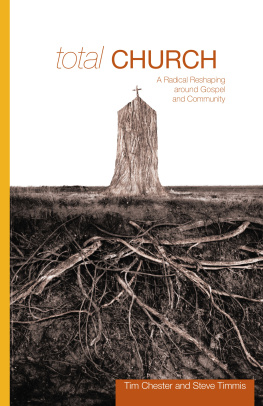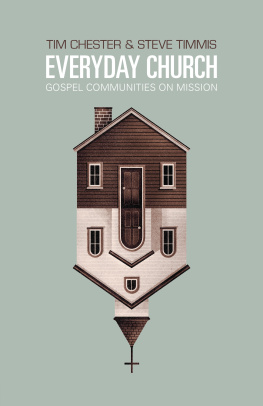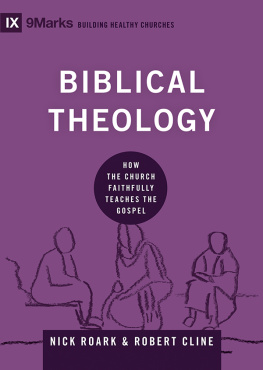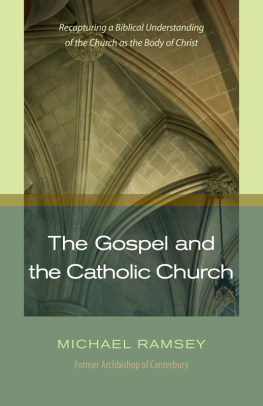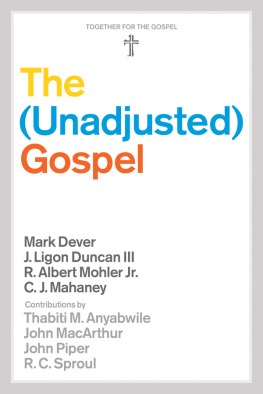INTRODUCCION
ALAN IS THE LEADER OF A small Baptist church. He moved to lead his suburban congregation five years ago after several years working in industry and three years studying in a theological college. He has seen a number of people join the church, but not as many as he had hoped. They have a thriving mothers-and-toddlers group, a solid youth work program, and an accomplished music group. And yet Alan cant help feeling that the church is only scratching the surface. Truth be told, it feels as if ministry has become a production line: churning out sermons, putting on events, trying to generate another wave of enthusiasm for evangelism. If only there were a different way of doing church.
Bob was converted as a teenager in a lively Anglican church, then became a youth group leader. Now he no longer goes to church. It had just become a burden, a set of responsibilities. He was always being asked to do things. If he didnt show up at meetings, questions were asked and eyebrows raised. Conflict among church members was the last straw. I dont need this, he told his wife the day he stopped going. He still reads his Bible, still prays, still tells unbelievers about Jesus if it comes up in conversation. Im just taking a break from church, he says. He can sense the disapproval when he runs into other Christians. He feels it himself. He knows Christians should be part of a church. But he cant face going back. If only there were a different way of doing church.
Cathy became a Christian in her first year at university. It was great. She spent hours hanging out with her Christian friends, talking through their faith, praying together, sharing the gospel with other students. But two years after graduation she feels spiritually flat. She goes to church each Sunday and attends a home group on Wednesday evenings. But she misses the intimacy of the relationships she had at university. She misses the discussions, the enthusiasm, and the late-night prayers. She laughs to herself at how immature they were sometimes. But she cant help wondering whether grown-up Christianity is any better. If only there were a different way of doing church.
Denzel was one of the founders of Elevate. Elevate grew out of a common desire to explore new ways of doing church. They were inspired by the alternative worship scene and some people within the emerging church movement. It started as a monthly gathering with images, incense, and meditations. From that came a weekly meeting in a pub. It was all very exciting at first. It still is. Denzel enjoys the energy that comes from doing something different. But he has some concerns. He suspects the Bible is not as central as it should be. Plus, although a number of other disaffected Christians have joined them, they dont seem to be impacting unbelievers. And then last week several members questioned whether adherents of other religions really need evangelizing. They talked about a safe place to ask questions, but Denzel felt uneasy. He thinks theyre really on to something, and he certainly doesnt want to go back to a hymn sandwich and a sermon. But increasingly he worries about what is being sacrificed. If only there were a different way of doing church.
These people are fictional, but their stories are all based on real conversations and real experiences.
THE AUTHORS STORIES
Maybe you can relate to Steves story. Steve was the minister of a church in a working-class community in northern England. It was his first charge, and it was something of a baptism by fire! The church was welcoming and caring, small and intimate. Looking back, despite all the early difficulties, it is hard to imagine a better place for a young man to be nurtured in ministry. The people loved the Lord and showed it in their love for his word and his people. Over time, the church grew as lives were changed by grace.
But for all that was good, Steve had a nagging sense of unease. The building was nearly full, but there were thousands outside. It was difficult to put his finger on it, but somehow so much of their life together as a church was inaccessible and irrelevant to those around. They loved each other, and the Bible was being taught, but he was growing increasingly aware of the almost impenetrable wall between the church and the world. It impacted traffic in both directions.
As Steve reflected, he saw two issues. First, for all the attempts at preaching Gods word in a faithful and contemporary way, there was little opportunity for non-Christians to hear it. Second, although Steve was convinced that theirs was a believing community loving one other, there was little opportunity for non-Christians to be exposed to it. If only there were a different way of doing church.
Tims story is different. He was brought up as a pastors kid. In his late teens his father was asking big questions about what it meant to be the church. Tim remembers long conversations as people shared their dreams about what church could be. At university he got the chance to make something of those dreams. He lived in a house with other Christianseating together, worshipping together, offering hospitality, sharing lives. He has vivid memories of sitting around a large, battered, old table with the remnants of a meal and celebrating Communion together.
But life was very different after graduation when Tim and his wife, Helen, moved to north London. Tim still remembers the first time they were invited out for a meal. They assumed it would be that evening or maybe the next day. But a date three weeks away was suggested. It turned out to be their first experience of a dinner party. It certainly wasnt sharing lives. If only there were a different way of doing church.
KEY PRINCIPLES
This book argues that two key principles should shape the way we do church: gospel and community. Christians are called to a dual fidelity: fidelity to the core content of the gospel and fidelity to the primary context of a believing community. Whether we are thinking about evangelism, social involvement, pastoral care, apologetics, discipleship, or teaching, the content is consistently the Christian gospel, and the context is consistently the Christian community. What we do is always defined by the gospel, and the context is always our belonging in the church. Our identity as Christians is defined by the gospel and the community.
Being gospel-centered actually involves two things. First, it means being word-centered because the gospel is a wordthe gospel is news, a message. Second, it means being mission-centered because the gospel is a word to be proclaimedthe gospel is good news, a missionary message.
So maybe we really have three principles. Christian practice must be (1) gospel-centered in the sense of being word-centered, (2) gospel-centered in the sense of being mission-centered, and (3) community-centered.
You may think this sounds like a statement of the obvious. We hope you do. But let us make two points by way of introduction.
1. In practice, conservative evangelicals place a proper emphasis on the gospel or on the word. Meanwhile others, like those who belong to the so-called emerging church, emphasize the importance of community. The emerging church is a loose movement of people who are exploring new forms of church. Each group suspects the other is weak where it is strong. Conservatives worry that the emerging church is soft on truth, too influenced by postmodernism. The emerging church accuses traditional churches of being too institutional, too program-oriented, often loveless and sometimes harsh.
Let us as authors nail our colors to the mast from the outset. We agree with the conservatives that the emerging church is too often soft on truth. But we do not think the answer is to be suspicious of community. Indeed, we think that conservatives often do not do truth well because they neglect community. Because people are not sharing their lives, truth is not applied and lived out.
Next page
